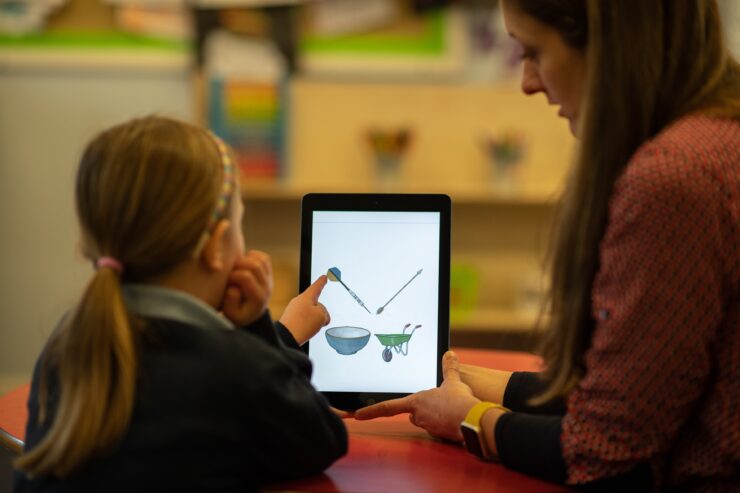Learning begins with language
The crucial role of early language skills in children’s learning

Oral language is at the heart of all learning, says Charles Hulme, Founder and CEO of OxEd & Assessment, an evidence-based educational company. Charles talks with Aisha Schnellmann about the cumulative importance of children’s language development and about the link between early oral language skills and both academic achievement and wellbeing.
Aisha Schnellmann: What are the biggest challenges facing children globally?
Charles Hulme: There is a continuing disparity in educational opportunities that is linked to socioeconomic background. Children from less affluent backgrounds often come to school less prepared to benefit from formal education, owing to a variety of factors. A powerful way in which social inequalities translate to educational inequalities is through differences in early language development. Many children, particularly those from disadvantaged backgrounds, start school with significant language delays. Without early identification and intervention, this gap often widens as children progress through their education. The results are poorer academic outcomes, reduced employment opportunities, and an increased likelihood of mental health issues. We see this pattern mirrored in all the regions we work in, including the UK, the United States, Paraguay, and the Middle East.
“A powerful way in which social inequalities translate to educational inequalities is through differences in early language development.”
AS: What do children need to help them thrive?
CH: Oral language is fundamental to reading, comprehension, communication, and social interaction. To thrive, children need to understand others and to be understood themselves. Language difficulties can have a cumulative effect throughout a person’s life. Early identification and intervention are therefore crucial to addressing language delays and ensuring that all children have the opportunity to reach their full potential.
AS: How is OxEd & Assessment helping children?
CH: At OxEd & Assessment, we turn research into practical tools that educators can trust to have a positive impact on their students. Our flagship initiative, the NELI Programme, is the result of decades of research into children’s early language and learning. Several randomised controlled trials and independent evaluations have demonstrated that it delivers substantial and lasting benefits for children’s language development.
We provide schools with tools to assess, diagnose, and support children who struggle with language difficulties, in an effort to help close the gap between disadvantaged children and their peers. Our work also includes comprehensive training for teachers and teaching assistants, ensuring that educators understand the importance of oral language in early education and are equipped to embed high-quality language teaching into their daily practice. Because of the strong evidence base behind NELI, we have had the privilege of working with Ministries of Education in the UK and Paraguay, and have had a positive impact on children in places like Australia, the Netherlands, Hawaii, and Dubai.
AS: What has inspired you in this work?
CH: As a researcher, I have learned that the research does not always confirm what we are expecting. In fact, it was unexpected findings that eventually led me to focus on oral language. In earlier projects, our goal was to demonstrate that early phonological skills were the best indicator of children’s future reading development. However, we found that it was actually early oral language skills that laid the foundation for children’s later reading abilities. Oral language skills in preschool predicted not only phonological skills just before school entry, but also children’s reading comprehension later in their educational careers. The more we explored the link between students’ language skills, their academic achievements, and their wellbeing, the more evident it became that oral language is truly foundational—and yet it is still often overlooked in education.
“We found that it was actually early oral language skills that laid the foundation for children’s later reading abilities.”
One of the most inspiring aspects of our work has been witnessing the profound impact that early interventions can have on children’s lives. It has been particularly exciting to see how quickly children can close the gap with their peers when given the right support and resources. Early intervention and ongoing investment in evidence-based educational programmes are critical.
AS: What is your vision for children in the future?
CH: My vision is a world in which oral language is at the heart of education systems and given equal importance alongside other important areas of instruction, such as phonics. By screening children for oral language delays at school entry—or even earlier—we can ensure that every child is able to thrive. Through the continued development of evidence-based interventions, we aim to reduce educational inequalities and help all children achieve their full potential.
Footnotes
Charles Hulme is an expert on reading, language, and memory processes and their development. He has developed a number of effective language and reading interventions. Charles is a Fellow of the British Academy, Fellow of the Academy of Social Sciences, and Fellow of Academia Europaea. He has received numerous awards for his research, including the Distinguished Scientific Contributions Award of the Society for the Scientific Study of Reading (2019), and is ranked among the leading researchers in the world in the fields of Psychology and Education (2023).
OxEd: Website, Facebook, LinkedIn
OxEd & Assessment is a finalist for the 2024 Klaus J. Jacobs Best Practice Prizes, which recognize institutions and individuals who are working to implement evidence-based solutions aimed at promoting child development and learning in practice.
This interview has been edited for clarity.

